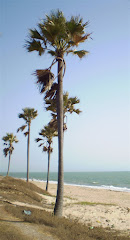There is an old man who sits across the street from the local hospital in the mornings, who I once stopped and talked with, and who now greets me every time I see him with a cordial, "Obama!"
I can't help but smile, as any greeting that doesn't start with "Toubab!" is greatly appreciated, but one that recognizes me by association with my native land is even sweeter.
He reminded me yesterday of how important it is to simply get out of the house and walk around town, taking the time to stop and greet people, even if I don't remember everyone’s name, and to respond to greetings from others with a smile and a wave, even if I continue on my path without stopping. I had been getting wrapped up in my own world lately, and lost perspective about why it is that I am here. These people are why I am here, what my work is for, who I should be caring about.
Sometimes it’s getting away that makes you realize why you want to be here. I got back yesterday from almost four days away from site, making the trip out for the weekend to Dakar for a regional volunteer meeting on Saturday, and staying on for just a few days of feeling like an independent American. I hadn’t realized how much I needed to refuel my batteries, to spend some precious quality time away from site, to just stay at the regional house and run on my own schedule, doing whatever I wanted, eating whatever and whenever I wanted, sleeping whenever I wanted, and just being me. I was staying at site feeling like I needed to get things done, but I had no motivation to do them. Being back now I feel more at peace with being here, less stressed, and just motivated enough to keep me going for a while.
Sunday I spent the whole afternoon doing nothing but reading Aldous Huxley’s “Brave New World,” which I picked up from the regional house library. After finishing the book, I was struck by how unsettled it made me, as reminiscent as it was of certain aspects of my Peace Corps experience. The “civilized world” versus the “savage reservation,” the triumph of the mechanical over the emotional, the power of conditioning trumping instinct… all of it echoed with a strange parallel to the reality I am now living. Huxley’s description of the “savage reservation” in comparison to his futuristic “civilized England” made me think about the typical, fresh-out-of-college American PCV when he first sets foot in a remote African village, how like the Alpha Bernard Marx when he first sees the pueblo on the reservation, how like Beta Lenina Crowne when she witnesses their rain dance.
And how strange it is that I should still feel this way in 2009, that we should have such disparity between the “developed” and “developing” worlds. Huxley wrote in the 1930’s that he had projected this distopia for 600 years in the future. It’s more than scary then that not even a century has passed since his vision, and the world is already in such a divided state of advancement.
But progress is a relative term. Huxley’s words narrated by the Savage resonated with me, as he spoke of “really living” and of claiming the right to experience joy and sorrow, passion and pain, even though in the “civilized” world those emotions would be a recipe for disastrous “instability.” In this fictional far future, everyone is conditioned (from the earliest stages of fetal life) not to have strong feelings about anything or anyone, keeping everything in a “perfect” state of balance and stability. But I agree with what Huxley was saying - that you can only feel true joy if you’ve been to the depths of sorrow, can only experience real passion after temptation and self-denial.
So as tragic as it was, I understood how the Savage could not continue to live in the “civilized world” - because being a feeling person in an unfeeling world is living torture.
If progress means losing all sense of what it is to be alive, then I too would rather be “savage” than “civilized.”
Two years in Senegal with the Peace Corps.
Check it out!
Where I'm going
DISCLAIMER
The content and opinions of this website belong to me alone. It is my personal site and I am solely responsible for its content. The views expressed do not reflect any position of the U.S. Government, the United States Peace Corps, the Republic of Senegal, or any other person or entity mentioned herein.
"What makes the desert beautiful," said the little prince, "is that somewhere it hides a well."
Antoine de Saint-Exupéry
Antoine de Saint-Exupéry



No comments:
Post a Comment